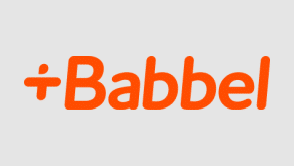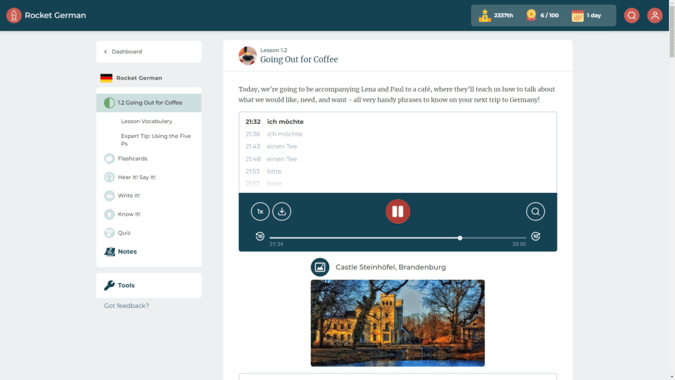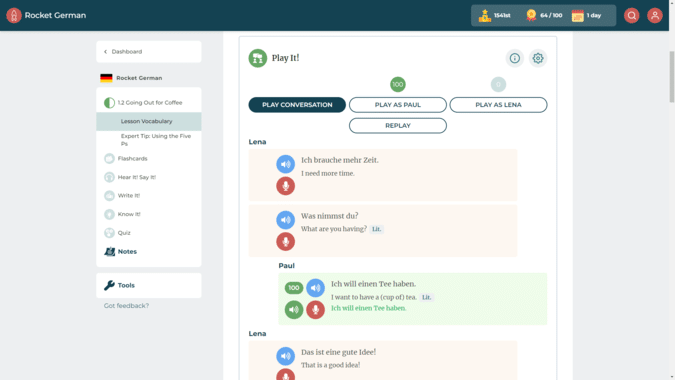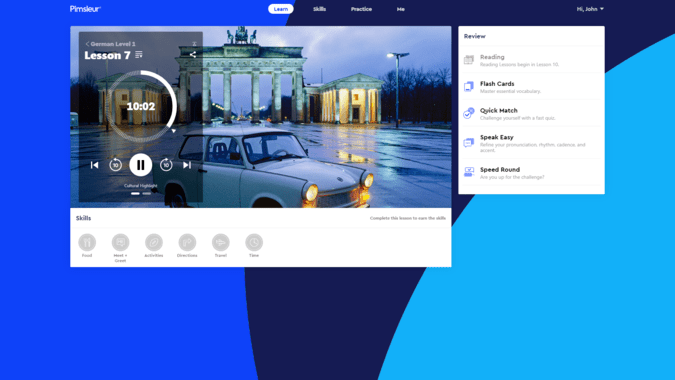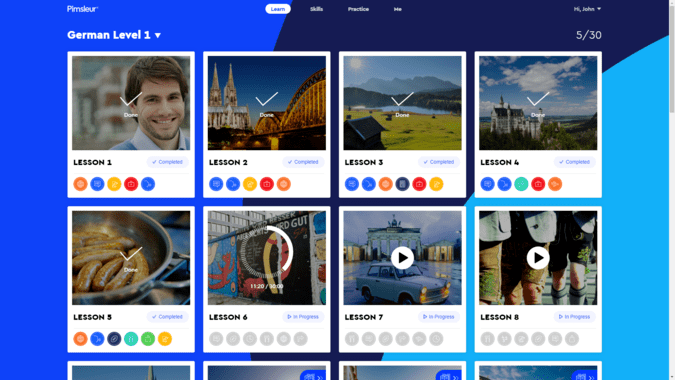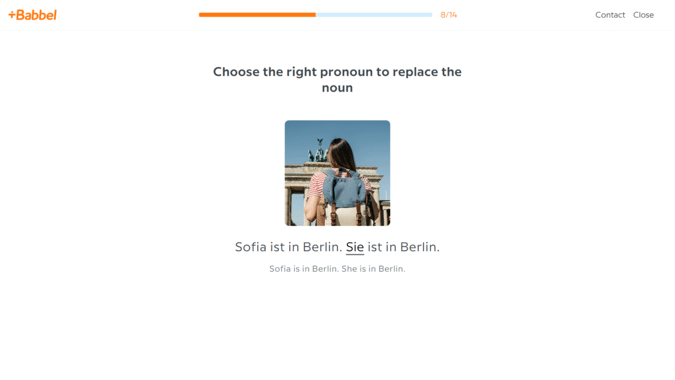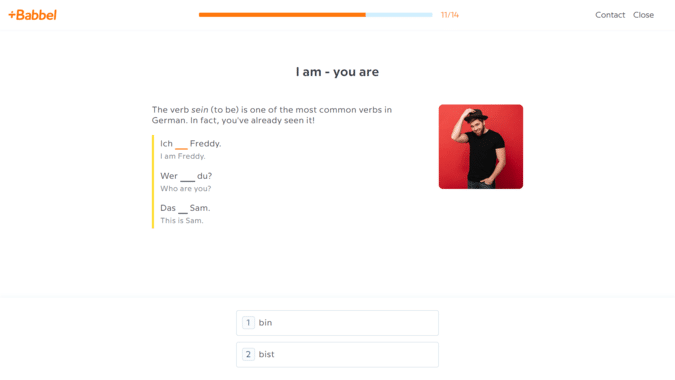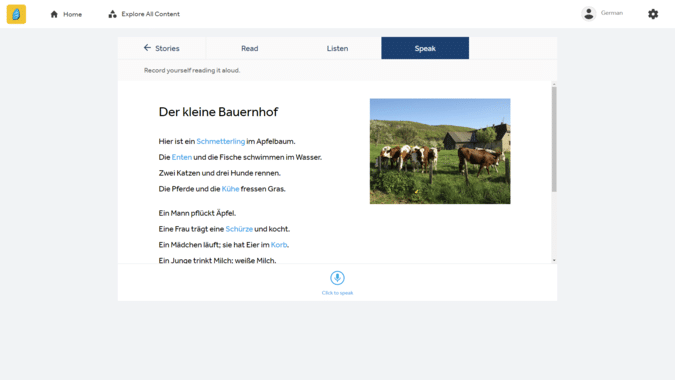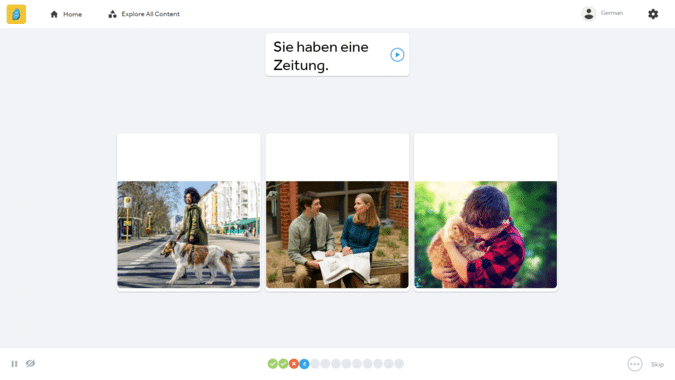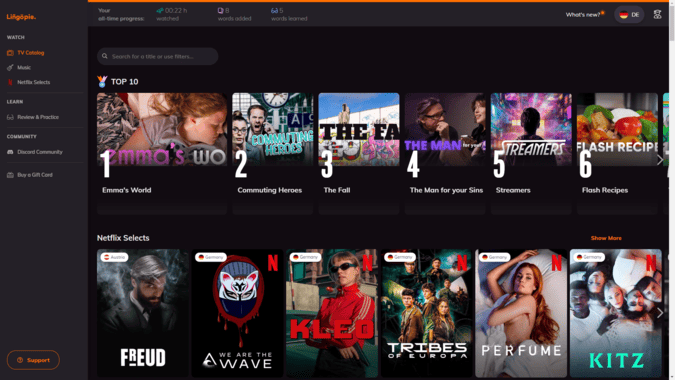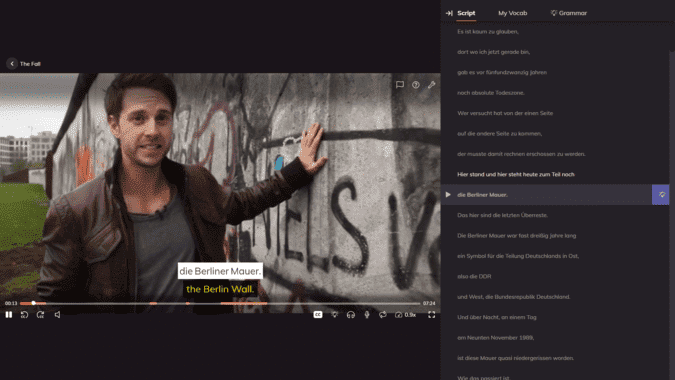SALE: 60% OFF
Code: INSIGHT60
A Note From The Author About Learning German
The German language is not easy to learn, especially for English speakers. Even though English and German share a common etymological history, the English language and the German language maintain considerable differences.
For instance, on average, German vocabulary is typically composed of much longer words than are found in English. The average word length for all words found in German is around 8.25. By contrast, the average character count for English words is approximately 7.26 – a full character less.
And I know you may be thinking “oh wow, a full character less. Big deal.” Well, it actually is a big deal. Over the course of 20,000+ vocabulary words in each language, it really adds up.
Or in relative terms, the average German word is 13.7% longer than its English counterpart. And given that there are thousands of words that are ten or more letters long (and contain tons of consonants), German can be plain hard to learn.
Not to mention, words in the German vocabulary can be a mouthful for English speakers. In fact, I have even heard native German speakers have trouble with some words. No joke. So don’t get discouraged with your language learning as you start out.
To learn German takes serious dedication, time, and a good German language learning app. I’ve outlined some of the better apps to learn German above that I’ve tested. In fact, at this point, I’ve tested over 20 of them.
Some have a free version. Some are pricey. Some have long lessons, some have short ones. And some were so bad I quit after two days. The point is that all these German programs have different strengths and weaknesses.
But no matter which one you pick, I have found that consistency in practicing is key. You need to be doing German language lessons every single day. And I know you may be thinking that the prospect of an everyday commitment sounds brutal. But it’s not, trust me.
Just make your language learning a part of your everyday routine. To learn German, you need to treat it like a habit. For me, this meant spending 30 minutes every evening after dinner on my German language learning app. But hey, it’s better than watching mindless TV.
Seriously. Consider the cognitive benefits of learning a new language like German. Instead of mindlessly watching some show on Netflix, you’re exercising your brain with language learning exercises and memorizing German vocabulary.
It’s like exercise for your mind. Plus, I have no idea if this is somehow grounded in science, but it helped me sleep better. That’s probably just me, but something about doing the lessons drained my brain – almost like studying for a big test.
So my best advice: don’t get discouraged, stay positive, practice everyday, and make using your German language learning app a part of your daily routine.
Bonus tips for learning German fast
Using your language app to learn German is just one piece of the puzzle (especially if you’re using the limited free version from a company).
Even for German language learners knocking out multiple lessons per day on their German language learning app, it’s not enough. If you want to become truly fluent in German, you’ll need to incorporate some other learning exercises and tricks into your daily habits. Here are six other tips I have to learn German.
Use Post-Its To Learn German
As I did lessons in my German language apps (again, I used multiple platforms), I routinely wrote the words on post-its. I would then leave the post-it’s all around my house.
I would place them on the refrigerator, calendar, appliances, pictures, wherever. My house was covered with German vocabulary on post-it notes.
Obviously, you won’t have a place to stick a post-it for every new German language word you learn. Verbs and adverbs are especially hard to account for with this trick.
For example, where would you stick a post-it for the verb “to remain.” Beats me too. My point is that nouns are easy, but other word types can be trickier.
Bottom line, for everyday items, which you speak about in German frequently as you start speaking German, this trick words great. Obviously, to converse with native German speakers you’ll need to elevate your German vocabulary (and corresponding hacks) at some point, but when starting out, it’s great.
Watch German Language TV
Watching television is not a new or novel language learning trick, but it does work. Obviously you will have to hit a certain threshold in your language learning journey in order to watch TV, but once you get there, this mechanism really works.
I would suggest starting with children’s shows. Sure, you can eventually switch to the German version of Two and a Half Men (my personal German favorite) and The Simpsons, but you need to start slow. Crawl before you walk.
You may feel like a fool watching German television shows made for toddlers, but they work surprisingly well.
In terms of where to find them, if you’re looking for some shows, check YouTube. There is a ton of free content on there. Sometimes the quality is a little spotty, and it can be hard to find solid recordings, but they are out there. Trust me, I’ve watched many of them myself.
Also, turn on the closed captioning subtitles. This is my pro tip here. That was especially helpful for me in learning the German language. After a while, you’ll want to turn off the closed captioning to focus on hearing the German language (and not reading it), but that will come in time.
Immersion Trip To Germany
Who doesn’t want to travel to Germany? If I am being honest, nothing expedited my learning German like actually traveling to Germany.
I know that isn’t what some people want to hear. Some people just can’t afford to take 2 weeks off and drop thousands of dollars on a trip to Berlin or Munich. But if you can, it is 100% worth it in terms of accelerating your German language skills.
Hearing the German language being spoken around you 24 hours a day for a few weeks is an incredible experience. Total immersion isn’t cheap or easy, but it really works. No arguing that.
I was hesitant to speak with locals when I first landed, but by the time I left, I was confidently speaking German, and even my grasp of German vocabulary had vastly improved. My recall was faster, my conjugations were quicker, and I knew I had corrected a lot of my bad habits in forming grammatically incorrect sentences.
The one issue is that because you’re a tourist, many German locals will try to speak to you in English. For one, they do this because they are friendly and want to accommodate you as a visitor. But secondly, they also want to practice their own English!
They don’t get the chance to speak English that often, so they try to take advantage of having a fluent English speaker in front of them. That was my experience at least.
Using YouTube To Learn German
I know I already mentioned YouTube above in relation to watching German children’s television shows. However, even beyond kids’ TV, YouTube can be a great resource. There are dozens of German language YouTube channels that focus on just what you’re after – learning German.
Most of the YouTube channel moderators are German language tutors and teachers, so they know their stuff. And I don’t just mean speaking the German language. I mean communicating how to learn.
This is the critical part of these videos. There are about 130 million people that speak German as their native tongue. But there are only so many that can effectively teach German to English speakers. So when you find a good channel or moderator on YouTube, stick with it.
Their videos cover basic vocabulary, grammar tips, filler words, how to conjugate, and a ton more. I especially love the videos that focus on cultural insights and tidbits. I love Germany, so learning cool cultural stuff is always fun for me.
Thus, as part of your learning routine, I would incorporate some YouTube videos, they are an awesome, free resource.
German Podcasts
There are a million German podcasts floating around the internet. However, many focus on soccer, politics, and pop culture – topics appealing to native German speakers. That said, there are also some aimed at teaching English speakers how to speak German.
They can be tough to find (especially in the US or UK podcast apps), but when you can find one that works, they’re great. In fact, many of these German podcasts are sponsored or created by the language companies themselves, like Babbel and Busuu.
That’s where I would actually start my search. Check out Babbel’s podcast, as well as those from other German app companies.
I especially liked listening to podcasts in the car on my way to work. You could just plug it in and do your best to follow along as you sit in traffic. It’s kind of like the mindless TV thing I mentioned above. Why listen to some crummy podcast talk about American pop culture when you can actually be learning something – like German.
I get that sometimes you are burned out after work, but at least on the way to work when you’re fresh, it’s a good use of time.
Are paid German apps really better than free ones?
Free apps like Duolingo are great to build vocabulary, but often skip grammar and speaking practice. Paid apps like Rocket German and Pimsleur offer full lessons, cultural tips, and verbal drills that move you toward fluency much faster.
German Social Media
My last and final tip for learning German (outside of the apps), is Reddit. The “r/German” subreddit is simply awesome.
It’s full of like-minded, eager learners of the German language. Some are advanced (I’d actually say most), but some are beginners too.
This subreddit is a great place to get questions answered, start a thread on an idea you have, or just troll around to kill time.
Rather than scrolling through Instagram when I’m sitting around, I love to go to this subreddit. There are always new threads and questions that I check out.
I rarely post, but when I have, people are very active and answer right away. I’ll check back 30 minutes after posting and will have 10+ responses. It’s kind of crazy actually. Not to mention, it has a great community feel. Not all subreddits have a community feel with positivity and collaboration, but the “r/German” subreddit definitely does.
Not to mention, sometimes as I look at some of the posts, it answers a lot of questions I didn’t even know I had. I can’t tell you how many times I saw a comment and went “oh my God that makes perfect sense. I don’t even think about that!” It’s like some people are mind readers.
In any event, it’s a great forum for engaging with like-minded German learners.
Other Thoughts On The German Language
I’ve loved Germany for as long as I can remember. Well, actually, since my first trip there when I was 17. I love the natural beauty, the food, and the people.
I know some people (namely, other Americans) say that German people are not the friendliest in the world. I beg to differ. I have never known German people to be anything but friendly, at least to me.
They always want to talk. Whether it’s to practice their own English, or because they want to make sure you like Germany and leave with a good perception of its people, I don’t know. But they’ve always been warm, engaging, and plain friendly. Almost like Southern hospitality in the United States.
In addition, I love the food. Oh my lord, I could talk about German food all day. Schnitzel, Bratwurst, Labskaus, Kartoffelknödel – I love it all. I wish there were more German restaurants here in the US. And Biergartens for that matter.
Then, of course, there is the natural beauty of Germany. From rolling green hills, to the Bavarian Alps, to the shores near Hamburg, to the shady Biergartens (I know, again with the Biergartens). There is so much natural beauty, I could spend months touring around Germany and get enough.
And one other aspect of German culture that I don’t think gets enough attention (at least not as much as other European destinations) is the architecture. The country is full of gorgeous buildings.
Obviously, the old churches and cathedrals are astounding, but even the government buildings, monuments and old houses are pretty. I particularly like Bavarian style homes in the Bauernhaus style.
Now, I’ve listed off a lot of beautiful things about Germany – the warm people, the Alps, the beer, the food. The list goes on. But you know one thing that isn’t the prettiest: the language. The German language just isn’t easy on the ears. In fact, it can be a little harsh.
But you know what I’ve discovered in it? It’s efficient and straightforward. In typical German style, it is to the point, direct, and rule-based. So even though it is not the most beautiful thing to hear (like some of the love languages), you have to appreciate its structure and effectiveness.
Conclusion
As I mentioned above, learning German is not easy. It takes time and consistency, so don’t get discouraged when you’re only a few months in and struggling to keep up with audio lessons. It will get easier, I promise.


